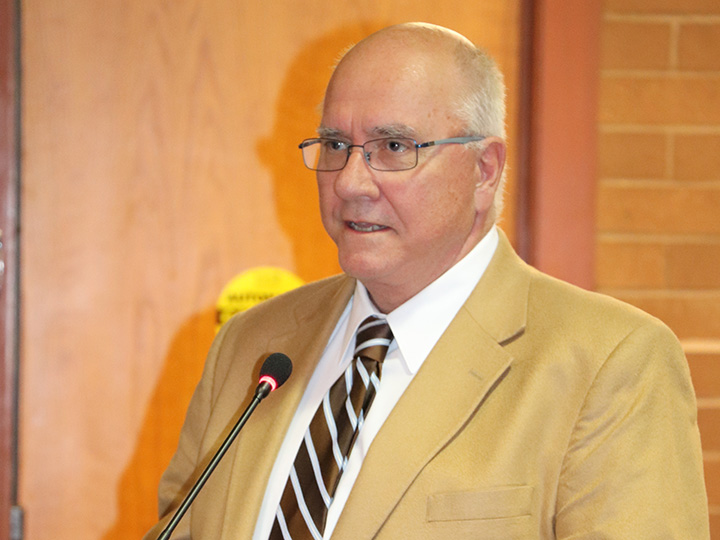
Community Services Block Grant (CSBG) funds are vital to Fresno County, as the Fresno Economic Opportunities Commission (EOC) uses these federal dollars to aid impoverished and low-income communities with services like job placement, housing, emergency assistance and the like.
Now, this essential funding source is in jeopardy as the head of the U.S. Department of Health and Human Services fails to understand its value on the local level. To ensure the CSBG funds keep coming, Fresno EOC is currently going around to each community seeking letters of support. After a council meeting held May 21, the City of Clovis became one of the first to approve such a letter signed by Mayor Bob Whalen.
While Clovis residents may not utilize the CSBG funded services as much as those in surrounding communities, the support from Clovis and Whalen in particular is huge as Whalen was the lead mayor of the One Voice trip, during which all mayors in the county agreed in urging congress to support CSBG. As the head, Whalen can effectively speak on behalf of all the local mayors that participated in One Voice.
“Our One Voice trip was really all of the communities in the County of Fresno saying this is a priority for us … I’m hoping we can somehow communicate that it’s not just Clovis and Fresno, but they need to know that all of the incorporated cities in the County of Fresno through our vetting process of One Voice have identified this as a priority,” Whalen said.
Brian Angus, the CEO of Fresno EOC, said the EOC is one of thousands of community action agencies in the United States, and surprisingly one of the largest—second only to an agency in Boston. With a bigger footprint in Fresno County than in Detroit, Chicago, New York or even Los Angeles, Angus said the Fresno area has a greater responsibility to communicate the importance of CSBG as a means of giving back to the community in need.
In 2018, the Fresno EOC received $1.8 million in CSBG funding and the elimination of that funding would be a substantial hit to the agency’s services and to the areas in the county most vulnerable who rely on those services to better their situations.
The purpose of the CSBG funding is to provide funding for services that mediate the causes and conditions of poverty. These services help low-income individuals and families do things such as secure meaningful employment, attain an adequate education, obtain adequate housing, attain emergency assistance, receive nutritional assistance and remove obstacles that hinder self-sufficiency.
“CSBG is our core funding,” Angus said. “It is a small portion of our funding but it does allow us to invest. The way we got to be who we are is we take this money we get from the federal government and invest it into new programs to try to and help what needs to be addressed as opposed to using the money to do one thing.
“This year we are spending money on a gang violence prevention program in west Fresno. We have people working in the school systems in west Fresno with the kids trying to keep them out of gangs. We have a special emphasis going on this year in the city of Mendota because we feel that if we just take our money and spread it out across the county, we aren’t going to have as much impact as if we take the money and put it for two or three years and focus on one community. Maybe we can take the poverty rate down and use that as an example to move on to other communities.”
In addition to gang prevention and a specific program for gang prevention in Mendota, Angus said finding gainful employment for low-income individuals is a priority of the Fresno EOC and a good portion of CSBG funds go toward employment and job training services.
“With high speed rail and all of the other school and hospital construction going on there is a great need for unions and we have a direct link to unions,” Angus said. “We’ve graduated 150 people in our VAC (Valley Apprenticeship Connections) program and placed 93 percent with a 100 percent retention rate and the jobs are anywhere from $20 to $50 an hour with the median around $27 an hour.”
The Fresno EOC is also working with the U.S. Department of Behavioral Health to address the growing opioid crisis.
“We’re always trying to align our capacity and resources with what the community needs,” Angus said.
CSBG funding has bipartisan support in congress, Angus said, so Fresno EOC and other agencies were caught off guard when the secretary of the Health and Human Services department, who puts together the funding packet that goes up to the president and through congress, made the following statement: “I haven’t heard from a single mayor and if the mayors don’t care about the program, why should I?”
The statement was confusing for Angus, who wasn’t sure how much local government officials should get involved with telling federal officials what to do. But, since the statement was made, it’s clear getting the local mayoral letters of support should aid the cause in showing that yes, in fact, CSBG does matter to the mayors and their communities.
Whalen said while he doesn’t want the funding to be in jeopardy, on one hand he is glad the secretary is pushing for more local involvement.
“I’m kind of glad he said that because I would like for the federal government to understand that local control is something that we want to encourage, but at the same time I don’t want that to sacrifice the opportunity we have to receive these funds,” Whalen said.
The council approved the letter of support for CSBG and Fresno EOC by a vote of 3-0, with Lynne Ashbeck absent and councilmember Vong Mouanoutoua abstaining due to conflict of interest as he works for Fresno EOC.









